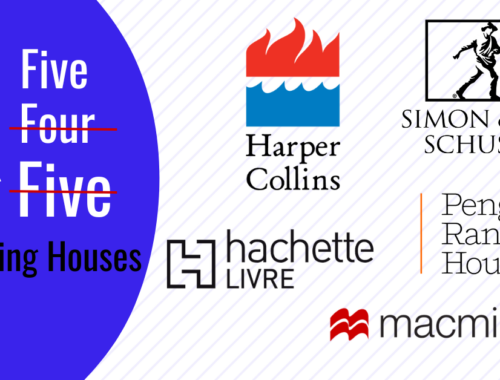
While the months continue to burn on faster and faster, this year proves to be an eventful one for the book and publishing industry. As authors continue to fight against the looming threat of artificial intelligence, librarians resist the ever-encroaching chains of censorship, and publishers reach record-breaking profits, we’re here through it all.
Here’s what you need to know about the major book industry news in October 2023. Also, be sure to check out our summary of news from September 2023.
- Weebs Are Saving the Comic Book Industry
- Censorship Shows No Signs of Slowing Down
- Penguin Random House Puts Its Money Where Its Mouth Is
- The Fight Against Artificial Intelligence—Is AI Stealing The Words of Stephen King and Zadie Smith?
- The Fantasy Genre is Back and Better Than Ever
Weebs Are Saving the Comic Book Industry
Though the publishing industry saw solid sales bumps in book sales due to the locked-in nature of the pandemic, graphic novel sales were still sidelined. Unless, of course, you consider the manga subcategory.
According to Publisher’s Weekly, readers are far less interested in Superman than they once were. Instead, manga novels—in the Japanese anime style—are surging in popularity.
As events like New York Comic Con are overrun with “weebs,” or those who are enthusiastic about Japanese culture and media, it’s apparent that serial manga graphic novels are carrying the mantle that names like Spiderman once did.
Whether their interest is shonen or shoujo, it’s time the publishing industry embraced weebs for the buying power that they possess.
Censorship Shows No Signs of Slowing Down
In an appeal brief in late October, Texas state attorneys continue to defend the state’s stringent book rating law. The state’s controversial law, better known as HB 900, has been argued to be constitutional, claiming that district Judge Alan D. Albright’s ruling had made “substantive errors” (via Publisher’s Weekly).
This restrictive law claims to “protect children from sexually explicit material at school” and helps parental guardians recognize “what books the State is purchasing for public schools with public money.”
Unfortunately, this law is not clearly defined. Due to the fact that it forces book sellers and vendors to “rate” books based on sexual content, many avid readers believe this law is intended to censor any type of LGBTQIA+ content, rather than truly graphic sexual content. As a result, many believe school children may be woefully underexposed to the truths about the world around them.
Even more, it poses questions about the power of state and federal governments and their possible encroachment on free speech and expression.
Penguin Random House Puts Its Money Where Its Mouth Is
Amongst growing fears of censorship across all age groups, but especially for children and young adults, publisher Penguin Random House decides to embrace the controversy.
In late October, after an increasing amount of censorship laws were passed and enforced in the United States, the famed publishing house announced a new competition for US citizens, intended to celebrate the freedom of speech and expression.
Penguin Random House’s Freedom of Expression Award offers $10,000 to applicants, asking them to write about a banned book. Essays may include how the banned book changed their worldview, expanded their knowledge, or simply opened their minds to the unfortunate realities of censorship.
Clare von Schilling, director of corporate communication and social responsibility at Penguin Random House, said of the Freedom of Expression Award (via The Guardian): “In the midst of censorship efforts, it’s crucial that we protect and celebrate freedom of expression, especially for young people whose voices we need and want to lift up, now more than ever.”
The generous Freedom of Expression Award, granted by Penguin Random House, is expected to be awarded to a university-bound high school student in 2024.
The Fight Against Artificial Intelligence—Is AI Stealing The Words of Stephen King and Zadie Smith?
Though groups in the United States and the United Kingdom have fervently spoken out against artificial intelligence being trained on the works of everyday authors, other European publishers have begun to join the fight.
During the world’s largest book fair in Frankfurt, European publishing trade bodies released an online statement on October 18. It called for European legislators to realize the potential of the European Union’s AI Act, which, as stated by The Guardian: “classifies AI systems according to the risk they pose to users and applies regulation accordingly… to ‘ensure the transparency’ of generative AI and ‘make it safer for European citizens.’”
This becomes especially important considering that even some of the biggest names in literature have been used to train AI language models—Stephen King, Zadie Smith, Rachel Cusk, Margaret Atwood, Haruki Murakami—and the list goes on. This groundbreaking news was first revealed by The Atlantic in August, but remains topical as the months drag on.
Authors, publishers, and readers have many questions for the creators of language models, but the most burning question seems to be: where does one draw the line?
Time will tell if college-aged creative writing majors will be able to use ChatGPT to generate the next Carrie or White Teeth.
The Fantasy Genre is Back and Better Than Ever
In October, London-based publisher Bloomsbury reported record profits in the first half of 2023. This is no doubt thanks—at least in part—to the American author Sarah J. Maas, who is well known for her fantasy series A Court of Thorns and Roses.
Better known as ACOTAR, Sarah J. Maas’ hit series has inspired a new love for the fantasy genre. Though the Harry Potter franchise remains a top seller, ACOTAR has reignited the joyous nature of the unbelievable for adult and young adult markets alike, much as the Lord of the Rings series did many years before.
According to The Guardian, Bloomsbury reports: “Fantasy is a huge and increasingly popular genre, which has driven forward our consumer demand.”
Whether it is due to fears of a looming recession that readers want to escape the doldrums of their everyday lives or a longing for something more magical, it is apparent that the fantasy genre will drive profits into 2024—especially if you’re writing about seductive faerie kings.

Summing Up
With so many months entrenched in controversy, October has proven to be no different for the publishing industry. Though book lovers may fret, it’s the readers that truly hold the power. Whether you’re a fan of fantasy faeries or an opposer of censorship, the book industry begs for your involvement.









